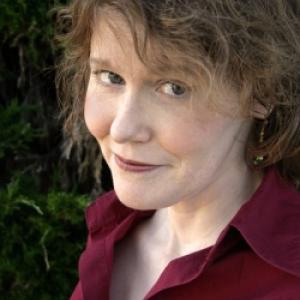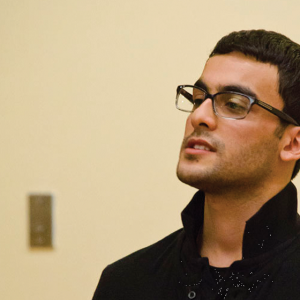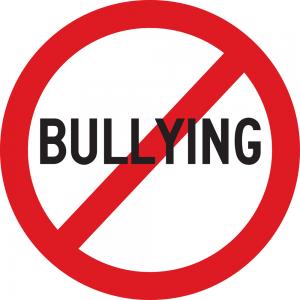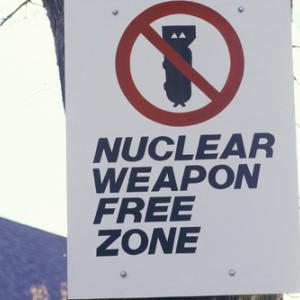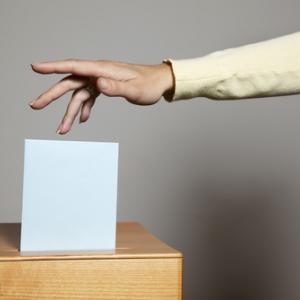
Jim Rice is a former editor of Sojourners magazine. From 1981 until his retirement in 2024, he served in a variety of roles at Sojourners, including as editor and managing editor of Sojourners magazine; director of Sojourners Outreach Ministry; and coordinator of Sojourners Peace Ministry.
Prior to joining Sojourners, Rice was an organizer for the Center for Peace Studies at Georgetown University. He was founder and co-director of Pax Christi: Washington's Peace Education Program and producer of the multimedia “Anatomy of the Nuclear Arms Race.” In addition, Rice served on the founding National Committee, Executive Committee, and Direct Action Task Force of the Nuclear Weapons Freeze Campaign, and he was treasurer of the Nuclear Weapons Education Fund. Before moving to D.C., Rice was the hunger action coordinator for the Oregon Center for Peace and Justice in Portland, Ore., and he spent two years as a member of the Jesuit Volunteer Corps. He was a member of the national advisory board for Evangelicals for Middle East Understanding and a research fellow for the New Media Project at Union Theological Seminary and Christian Theological Seminary.
Rice, a graduate of Seattle University, is a native of Richland, Wash., the bedroom community of the Hanford Nuclear Reservation. Rice was a long-time member of Sojourners Community, an intentional Christian renewal community located in inner-city Washington, D.C. He and his wife, Dawn, have two children and two grandchildren. He is a member of Hyattsville Mennonite Church outside of Washington.
Selected Sojourners articles by Jim Rice
- 'Simple is the New Chic' In John Carr's view, Pope Francis is already shaking up the Catholic Church — and the best is yet to come.
- The Party of No Compromise GOP attempts to circumvent the health-care law range from the inane to downright bullying.
- Our Dolls, Our Selves Even at their best, toys like the American Girls Dolls send a mix message.
- Future's So Bright "“Given the option of paying more for dirty power or paying less for clean power, what would you take?” (May 2013)
- 'A World Without Nuclear Weapons' The way to stop is to stop. (March 2013)
- Who Speaks for Catholics? Before the election, several bishops went so far as to threaten their parishioners with eternal damnation if they voted for Obama. (January 2013)
- Our Endorsement for President The constraints on political engagement by nonprofits can be frustrating for those committed to social change. (November 2012)
- 'A Clash of Fanaticisms' We'll never reach reconciliation between Christians and Muslims until we address root causes — and take on the haters. (November 2012)
- War Crimes and Misdemeanors Hey Pres. Obama: The Nobel Peace Prize committee is calling. They want their medal back. (August 2012)
- Fairness for Whom? Fairness matters, especially for people on society’s margins — and that conviction goes far beyond tax equity to every aspect of public policy. For people of the Book, it’s much more important than politics; it’s a matter of faith. (June 2012)
- Obesity in a World of Hunger A new definition of malnutrition is emerging, as formerly developing countries are globalized into “fast-food nation” lifestyles. (May 2012)
- Are Voter-ID Laws Racist? More than 5 million voters could be affected by new Voter-ID laws and (coincidentally?) a disproportionate number of them are people of color. (April 2012)
- Occupy the Future The Occupy movement has already established its legacy — by changing the nation's conversation about wealth inequality. (March 2012)
- 'Power to the People' Renewable energy sources aren't just safer than nuclear power — they're also cheaper. (June 2011)
- 'Tear Down This Wall' An interview with Palestinian Christian activist Sami Awad on why nonviolence is key to Middle East justice. (May 2010)
- Composting with Worms Sojourners editor Jim Rice and his family have been composting with worms for more than a decade. In this video how-to, he shares 7 steps to composting with worms. (December 2009)
- The Path to Peace in the Middle East Lessons from Gaza. (March 2009)
- The Meaning of 'Life' Once thought to be in the pocket of the Religious Right, many American evangelicals today are discovering a deeper understanding of what it means to be pro-life. With Jeannie Choi. (November 2008)
- The Roots of Justice Revival During the Second Great Awakening, the fruits of conversion included social reform. (April 2008
- Loving our Neighbors Christian-Muslim dialogue raises hope — and suspicion. (April 2008)
- Being There "God's Smuggler" Brother Andrew has an odd way of breaking down barriers between Christians and Muslims. But somehow it works. (March 2008)
- Is Nuclear Power the Answer? Proponents claim that nuclear energy is the power source of the future - clean, green, and safe. Are they right? Cover feature. (August 2007)
- A Rubicon Crossed The church consensus is solidifying on the need to save the planet. (April 2007)
- Gandhi For Today How would Mahatma Gandhi confront terrorism today? And what action would the apostle of nonviolence take in response to the wars waged in the name of anti-terrorism? A review of David Cortright’s “Gandhi and Beyond: Nonviolence for an Age of Terrorism.” (December 2006)
- Hope Amid the Ruins Out of the carnage of Middle East war, can real peace ever be achieved? (September/October 2006)
- Nonviolence is Our Only Hope In the Middle East, only justice for all is justice at all. (August 2005)
- Reagan's Legacy On mourning in America. (August 2004)
- The Burden of Truth. An interview with two former CIA analysts on the lies behind the Iraq war and the heavy weight of conscience. (November-December 2003)
- "School Choice" Passes a Test. A victory for vouchers — but who wins? (September-October 2002)
- Sins of the Fathers. The deepest guilt is the church's. (May-June 2002)
- Unfoolish Consistency. Moral principles, not politics, guide the bishops. (January-February 2001)
- Core Values. The Broetjes, owners of the largest apple orchard in Washington state, had a crazy idea — to treat their workers like people. (November-December 2000)
- A Blank Check for China? China is the current battleground — as Seattle was last fall — over the rules of global trade. (May-June 2000)
- Sandino Lives! Actually, even in Nicaragua, revolutionary fervor isn't what it used to be. (March-April 2000)
- Rome Not Quite Ready for Women Priests. (November-December 1998)
- Whatever Happened to Lt. Calley? (November-December 1998)
- A Squandered Opportunity. The biggest obstacle to Palestinian Democracy may well be the emerging state's founding father, Yasir Arafat. (July-August 1997)
- Why Play? Contemplation, freedom, and the spirit of leisure. (January-February 1997)
- Bernardin's Most Important Year. (November-December 1996)
- Beyond the Nuclear Test Ban. (November-December 1996)
- Crack, Contras, and the CIA. (November-December 1996)
- With "Friends" Like These. What to do about sleazy TV? (May-June 1996)
- Justifying the Next War. The real-world effects of the just war theory. (March-April 1996)
- Into Bosnia. Mixed motives and good fruit. (January-February 1996)
- Getting Beyond Labels. Serpents, doves, and the Religious Right. (March-April 1995)
- “Cautious Optimism” on Haiti. Reconciliation in Haiti must be preceded by repentance and rooted in truth. (November 1994)
- The Armor of Righteousness. The Christian Right makes its bid for the political mainstream. (November 1994)
- Where Angels Fear to Tread. (November 1994)
- Shifting Terrain in Korea. Without Jimmy Carter's risky pilgrimage, the world would be a more dangerous place. (September-October 1994)
- Too Many People? The unavoidable reality is that where there is severe poverty, adding more people makes the suffering worse. (August 1994)
- Seeking Common Ground on Abortion. (July 1994)
- The Last Comeback of Richard Nixon. (July 1994)
- World Bank/IMF: 50 Years Is Enough. The Bank will not change its economic model without outside pressure. (July 1994)
- When Dignity Is Assaulted. Biblically based Christians must forcefully oppose this deceptive, homophobic campaign of the Far Right. (February-March 1994)
- NAFTA's Fatal Flaws. (December 1993)
- Be Like Mike? Michael Jordan or Madonna may be worth talking about, but they arguably serve no principle beyond themselves. (September-October 1993)
- Saying No to Bigotry. Why the church must stand up for gay rights. (February-March 1993)
- Cultures in Conflict. Inner-city tensions explode on the streets of Washington, D.C. (July 1991)
- SDI-Lite: Old Wine in New Skins. (May 1991)
- On The Front Lines Of Resistance. Conscientious objectors struggle for recognition. (April 1991)
- Mistakes Were Made Will the Nuclear Industry's Post-Cold War PR Campaign Work? (January 1991)
Posts By This Author
'War is Terrorism'
ONE DAY, WHEN I was a student at Christ the King Elementary School in my hometown of Richland, Wash., the nuns gathered all the kids, two by two, and walked us outside to the parking lot. There sat a mobile van emblazoned with the logo of the Atomic Energy Commission and the words “Whole Body Scanner.”
One at a time, we were led into the van, where we laid on a white-sheathed table beneath a large, (scary), medical-looking machine. There was a whirring sound, and after a minute or two we were told to get up and make room for the next child. We weren’t told what the process was for, but it’s safe to assume that the government was interested in the effects of radiation on those of us who were “downwinders” from one of the nation’s largest nuclear complexes.
Richland was (and is) the bedroom community for the Hanford Nuclear Reservation. Hanford was built in the 1940s as part of the Manhattan Project, the massive wartime program that led to the atomic bombs dropped on Hiroshima and Nagasaki at the end of World War II. Hanford’s role was the production of plutonium for the world’s first nuclear weapon, the “test” bomb detonated in New Mexico a few weeks before Hiroshima, and for the bomb that destroyed Nagasaki three days later.
Those weapons were dropped 69 years ago, but the debate about their morality continues. It emerged again this spring when the two Missouri senators proposed renaming D.C.’s Union Station after Harry S. Truman, who authorized history’s only nuclear attack on people. One commenter in a related discussion wrote, “I have a problem with judging past cultures by today's standards. To end WWII we dropped bombs on cities filled with innocent civilians. By today's standards that would be condemned. Are you willing to say we should not have done that to end WWII?”
Cherish Each Moment — Even the Sucky Ones
ELIZABETH PALMBERG—Zab to her friends—says her motto is “Cherish each moment, even the ones that suck.”
Nine years ago, she was diagnosed with Hodgkin’s lymphoma. She has had her ups and downs in her battle against cancer, but many moments in that journey have undeniably sucked.
In 2001, Zab was a college professor in California when she applied to be an intern at Sojourners. We decided her Ph.D. (in Victorian literature) perhaps qualified her to do the data entry and fact-checking work required of our editorial intern, and when her yearlong internship was over we invited her to become a full-time member of the editorial staff.
She’s been gracing us, and our readers, with her brilliant analysis and quirky wit ever since. Her knowledge, passion, and insight informed and often challenged those of us who’ve worked closely with her—and led to outside recognition as well. In 2011, for instance, Zab joined a Witness for Peace delegation to Colombia, visiting communities engaged in the difficult work of peacebuilding and conflict resolution. Her report on the trip—the last feature she wrote for the magazine—was honored by the Associated Church Press as the best news article of the year.
In November 2012, she wrote on her blog, “Just as I was planning a big six-year hey-they-cured-my-cancer party, it turned out I have cancer again.” Months of difficult treatment followed, and she chronicled the good times and the bad with (most of the time) her sense of humor firmly intact. For instance, she wrote that “technically, the exact wrong thing to read [during chemotherapy] is Thomas Hardy’s Jude the Obscure, which also happens to be the wrong thing to read in almost *every* context—that book really puts the “ick” in ‘Victorian.’ My deepest apologies to the one class I forced to read it. I don’t know what I was thinking.”
Profiles in Courage
THE ULTIMATE BRAVERY might well be the courage to forgive one’s enemies and hold on to hope.
Nelson Mandela famously emerged from 27 years in prison as a reconciler and uniter, somehow free from bitterness and hatred. He was able to put into practice Jesus’ call to love our enemies—and thus became the father of the new South Africa.
Far from the upper echelons of power and fame, forgiving our enemies can be a difficult task, since “enemies,” by their very definition, aren’t easy to love. But in places of oppression, occupation, and routine violence, it’s even harder.
Take, for example, the story of a young man named Yousef Bashir. He grew up in the Gaza Strip, near an Israeli settlement known as Kfar Darom. In 2000, Palestinians rose up in protest against the Israeli occupation in what became known as the Second Intifada. In response, Israeli soldiers came to Yousef’s house and told his family to leave.
His father had dedicated his life to teaching Yousef and his brothers “how to coexist with the Israelis,” Yousef explained over lunch in Philadelphia early this winter, and he insisted on staying in their long-time family home. As a result, Yousef said, Israeli soldiers moved into the Bashir family’s house when he was 11 years old. They occupied the house until he was 15.
The Mythical World of Tom Clancy
The books of Tom Clancy, who passed away this week, contain some of the most detailed description of military weaponry and procedures the public is likely to see. And people want to believe it: Clancy’s world is one in which technology can provide security and the so-called experts can be trusted to protect us. He takes a complex world and doesn’t merely simplify it, but rather creates super humans and super machines that can manage the world’s complexities.
The Party of No Compromise
I SPENT MY first year after college doing voluntary service in Portland, Ore., serving as the hunger action coordinator for a small Catholic organization called the Oregon Center for Peace and Justice. That fall, I joined a group of church anti-hunger activists from around the state in a meeting with our Republican U.S. senator, Mark O. Hatfield. We asked him a number of questions, and urged his continuing support for food- and hunger-related legislation.
When it came my turn, I said, “Senator, how do you reconcile the compromises that you inevitably have to make as a politician with the ideals you hold as a Christian?” In his reply, Sen. Hatfield pointed to the difference between compromises of principle—which he said he would never make—and the tactical compromises necessary to make progress in a pluralistic society. Without the latter, the senator said, politics is nothing but an ideological shouting match.
These days, it’s clear that most far-right Republicans, including those in the party’s leadership, take a slightly different approach to inter-party cooperation than did the late Sen. Hatfield. They seem to see it less as building bridges for the sake of governing a varied society and more as sleeping with the enemy.
There’s probably no better recent example than the issue of health care. The Affordable Care Act, aka Obamacare, is the law of the land—passed by Congress, signed by the president, and ruled constitutional by the Supreme Court. But none of those legal niceties seem to matter to the raw-meat GOP. Their attempts to circumvent or undercut the law range from the inane (such as 67 failed tries—count them: 67—to overturn the ACA by congressional vote) to downright bullying.
'Simple is the New Chic'
RIGHT FROM THE beginning, John Carr saw Pope Francis as a “great sign of hope.”
Carr, who spent more than two decades as the U.S. bishops’ top peace and justice officer, was home, working at his kitchen table, when the white smoke came up announcing the selection of the new pope. “I thought, ‘Oh, my,’ and this guy I didn’t recognize came out,” Carr said. “When he said the name ‘Francis,’ I thought ‘it’s going to be okay.’”
As executive director of the Department of Justice, Peace, and Human Development at the U.S. Catholic bishops’ conference, Carr carried a rather large portfolio. He often tells the story of being introduced by a man who said, “He’s in charge of social development and world peace.” The man’s wife, in Carr’s telling, looked at him and said, “You need to do a better job.”
Since leaving the bishops’ staff last year, Carr has launched a new initiative, based at Georgetown University, aimed at helping lay people “become more informed and engaged in their vocation to be ‘salt, light, and leaven’” in public life. Carr, who visited Sojourners’ office this spring, is encouraged that the election of Pope Francis “has provided incredible visibility, urgency, and passion” around social issues. “When he was going to be elected, his friend said, ‘Don’t forget the poor,’” Carr explained. “A church that moves to the edge to care for the weak and vulnerable is a church you want to be a part of.”
Our Dolls, Our Selves
WHEN MY DAUGHTER, Jessica, was 7 years old, some of her best friends had American Girl dolls, so of course she desperately needed one as well. We asked three or four family members to chip in—these were expensive dolls—and got her one for Christmas.
Her doll, “Addy,” came with a story, as did each in the American Girl line. Addy and her mother had escaped from slavery in the American South, and they “followed the drinking gourd” north to Philadelphia, where they were eventually reunited with the rest of Addy’s family. It was a gripping story, especially for a 7-year-old. And the fact that Addy was about my daughter’s age made it all the easier for her to connect.
“It wasn’t so much that I learned ‘facts’” about slavery and race from the Addy stories, Jessica, now 27, told me recently, “but they made it all more personal. Addy was young, like me—I could relate to it.”
Other women who grew up with the dolls echoed that sense of connection with the various American Girl stories. Janelle Tupper, campaigns assistant at Sojourners, was around 7 when she received the “Kirsten” doll, a Swedish immigrant to the U.S. “My most distinct memory from the stories was that, on the boat, her best friend dies of cholera,” Tupper said. “Reading that passage was pretty devastating to me as a kid.” Other books in the American Girl series addressed issues of the day, from child labor to women’s suffrage. And while Tupper said she wasn’t aware as a child of the social justice themes in the stories—“I was just imagining life in the different time periods through the eyes of a character I identified with”—she now sees the series as addressing “societal change in terms that an 8- year-old can understand, often told through the characters’ friendships and family stories.”
Future's So Bright
EARLIER THIS YEAR, 14 solar panels were installed on my roof. Each day since—in fact, multiple times a day—I've eagerly checked our online meters, as the sun replaces coal and nuclear plants as the provider of my home's electrical needs.
I've waited a long time for this. I attended my first energy conference in the late 1970s, when I joined several other students from the hunger action group at our Jesuit college, Seattle U., for the 20-hour van ride to Denver—even then, the connection between poverty and energy issues was clear.
That conference was one of several conducted by the U.S. Catholic bishops to gather input for what became a major and still-relevant document published in 1981 under the unassuming name "Reflections on the Energy Crisis." The statement noted that "solar power can help open the way to permanent energy security, pointing beyond the end of fossil fuels."
So last summer I was thrilled to sign a contract with a company called SolarCity, which installed the solar panels on my rooftop under a lease arrangement—they own the panels, and I buy solar power from them whenever the sun shines. And there's sure a lot of sunshine to tap: Every hour of daylight on earth, the sun releases the amount of energy consumed by the entire population of the planet in one year.
From the Archives: May 1990
IN THE summer of 1969, then-Sen. Gaylord Nelson was on a conservation speaking tour of the West when he visited the beaches of Santa Barbara, at that time despoiled by one of the worst oil spills in U.S. history. The devastation affected him deeply. Later, while reading an article about the teach-ins organized by anti-Vietnam War activists, Nelson asked himself, Why not have a day for a nationwide teach-in on the environment? Thus was born Earth Day 1970.
The original Earth Day was marked by a massive public outpouring of concern for the environment. Earth Day helped spawn new laws such as the Clean Air and Water Acts and the creation of the Environmental Protection Agency, but it did little to staunch the more serious wounds of our dying planet. ... Much of the activity during the 20th-anniversary celebration of Earth Day this April 22 will focus on individual acts. ... But there is a danger in an overemphasis on personal acts, when the most grievous assaults on the natural world come from corporations and nations whose self-interested policies of acquisitiveness and greed have brought us to the edge of ecological cataclysm.
'A World Without Nuclear Weapons'
HOW MANY NUCLEAR weapons make us "safe"?
At the height of the Cold War, both the U.S. and the Soviet Union had tens of thousands of nuclear warheads, aimed at each other's cities, towns, and military targets. Not many felt that the world was somehow made safe by this hair-trigger, apocalypse-risking standoff.
The Soviet Union is long gone, but the Cold War mentality that fueled the era's nuclear arms race seems to linger on. According to a December report by the Federation of American Scientists, the world's combined stockpile of nuclear warheads is still more than 17,000. Of these, the report continues, "some 4,300 warheads are considered operational, of which about 1,800 U.S. and Russian warheads are on high alert, ready for use on short notice."
President Obama, for his part, has laid out what he called his "vision of a world without nuclear weapons." In a speech last March in Seoul, South Korea, Obama said the goal of a nuclear-free world "would not be reached quickly, perhaps not in my lifetime," but that it must begin "with concrete steps." He continued, the "massive nuclear arsenal we inherited from the Cold War is poorly suited for today's threats," and "we can already say with confidence that we have more nuclear weapons than we need." (That could be considered a gross understatement, since the next leading nuclear threat—China—has only about 50 warheads on ICBMs that could reach the U.S.)
Who Speaks for Catholics?
FATHER JACK MORRIS was one of those Catholic priests who ruined a lot of people for life. I'm one of them.
Father Morris passed away Sept. 30 in Spokane, Wash. He was working with the Catholic sisters and others who ran the highly regarded Copper Valley School in Alaska in the late 1950s when he took the idea of young people volunteering their time with and for Native Alaskans and helped turn it into the Jesuit Volunteer Corps. Since then, more than 12,000 people have served in the JVC, whose motto "ruined for life" reflects the fact that voluntary service often makes enduring changes in the way participants view the world. (A few years ago, Father Morris told Sojourners that the motto is "a resurrection statement"—through volunteering, he said, "you're transformed.")
I spent my first two years after college as a Jesuit Volunteer, first at the Oregon Center for Peace and Justice in Portland and then at Georgetown University's Center for Peace Studies. My mentor and boss in Portland was the center's director, Sister Michele Phiffer. She worked for years helping Catholics in Oregon understand the church's social teaching on the common good and the preferential option for people who are poor.
Perhaps needless to say, the local bishops weren't always on her side. In fact, it often appeared—even to my young eyes—that the bishops were more interested in protecting their own privilege and power than in genuinely working for the marginalized. And Sister Michele's gender seemed to be a factor in the lack of support she received from the episcopal powers that were.
Our Endorsement for President
ELECTIONS CAN BE challenging times for nonprofit organizations, especially those of us deeply committed to social change. Sojourners is incorporated under the IRS Code as a 501(c)(3) organization, which means that we are prohibited from “directly or indirectly participating in, or intervening in, any political campaign on behalf of (or in opposition to) any candidate for elective public office.”
While scrupulously avoiding “intervening” in any partisan activities, we of course remain committed to our mission, which is to “articulate the biblical call to social justice, inspiring hope and building a movement to transform individuals, communities, the church, and the world.”
Those two poles—staying neutral in partisan campaigns, on the one hand, and working to build a movement to “change the world,” on the other—define the space within which we work, during an election year and at any other time.
We believe that elections matter—especially, from a biblical point of view, because they profoundly affect those that scripture calls the “least of these,” the likelihood of war or peace, and the health of our planet. (See Jim Wallis’ article “How to Choose a President” for more on that theme.) And many of us have strong convictions about which candidates, and which party’s approach, better reflect those biblical commitments.
'A Clash of Fanaticisms'
WHEN AMBASSADOR Chris Stevens and other embassy staff were killed in Benghazi in September, it struck close to home for us at Sojourners. The last time a U.S. ambassador was slain was in 1979, when Adolph Dubs, the American ambassador to Afghanistan, was kidnapped by Islamic extremists and later killed. His daughter, Lindsay Dubs, was Sojourners’ managing editor. The degrees of separation between world events and the home front are often slim.
Some attributed last month’s violence in the Middle East to “fanaticism,” a “blind and tragic barbarism” by “imbeciles.” Others used words such as “beyond pathetic,” “fringe,” and “extremists.”
Those descriptions were applied to both those who created the anti-Islam video that provided the spark, and those who used the hateful video as a reason, or excuse, to engage in violent protests against the United States and the “West,” including Israel.
The media repeatedly summarized the cause of the violence as resting in the intentionally offensive video, and said that Muslims, angered by the blasphemous depiction of the Prophet Muhammad, rioted in a blind and uncontrollable rage. Moustafa Bayoumi, writing for the Middle East Research and Information Project, described the process: “Islamophobes provoke. Too many Muslims respond. Non-Muslims believe Muslims are crazy. Muslims are told the West hates them, and the Islamophobic right sleeps well at night with their cozy dreams of a mission accomplished.”
War Crimes and Misdemeanors
HEY PRESIDENT OBAMA: The Nobel Peace Prize committee is calling. They want their medal back.
The coveted award, which many felt was premature, at best, when bestowed during the president’s first year in office, was seriously tarnished in the eyes of many by his escalation of the war in Afghanistan and other military endeavors.
But Obama’s role in waging drone warfare—particularly in Pakistan and Yemen—has made a mockery of the prize that Alfred Nobel said should go to the person “who shall have done the most or the best work for fraternity between nations.”
Obama’s drone attacks—according to a May investigation by The New York Times, Daniel Klaidman’s new book Kill or Capture, and other sources—are arguably in direct violation of U.S. and international law, and immoral to boot.
The drone attacks started out with clear rules: Only target those who represent a direct threat to the United States. Those rules soon went out the door—a senior U.S. official called it a “little liberalization that went on in the kill lists,” according to The Washington Post, while a former counterterrorism official said that “the elasticity of that has grown over time.”
A Spirituality of Privacy
Politically, the right to online privacy seems like a no-brainer. Just as employers, and the government, shouldn’t be allowed to snoop through one’s personal diary or journal, the privacy of our digital records should be likewise respected, in law and in practice.
But biblically, theologically, and spiritually, it gets more complicated. For instance, what would a “spirituality of privacy” look like? At the core of spirituality is a connection with the divine. That begins in our heart of hearts and is by necessity a private, solitary practice. But it doesn’t end there. Genuine, life-transforming spirituality is personal, but never “private,” in the sense of “restricted to me alone.” Rather, spirituality is about the connection between a person and the divine and about the connection between a person and other people. In other words, there is an essential communal, public aspect of spirituality. Genuine spiritual enlightenment leads not only to an enriching of our connection with God, but with one another as well. Thus in some ways the distinction between a “private” spirituality and our public face is an artificial one, and at our best these two aspects of our being will be in harmonious synchronicity.
Fairness for Whom?
It’s a good sign we’ve entered the election silly season when pundits are arguing against “fairness.” What’s next, apple pie? (Motherhood, of course, is already a battleground of the “mommy wars”—Lord help us!)
The Democrats are trying to take the pro-fairness side of the debate, in particular around the issue of tax rates for the wealthiest Americans. The so-called Buffett Rule—named after billionaire Warren Buffet, who pointed out the injustice of his paying a lower tax rate than his secretary—became a key talking point the week before April 15.
Here’s how President Obama put it: “Right now, the share of our national income flowing to the top 1 percent has climbed to levels we haven’t seen since the 1920s. And yet those same people are also paying taxes at one of the lowest rates in 50 years. That’s not fair.” (The Occupy movement arguably deserves most of the credit for that framing of the issue.)
The president’s political opponents were quick to dismiss the focus on tax fairness as campaign rhetoric aimed more at the fall elections than any meaningful policy goals. It’s a safe assumption that pretty much anything between now and November has that partisan goal in mind, and—perhaps not surprising—fairness polls well.
But the critics didn’t stop there. Conservative columnist Charles Krauthammer, for instance, called the Buffett Rule “nothing but a form of redistributionism,” and said that focus on the tax fairness issue “is an exercise in misdirection.” Minority Leader Mitch McConnell said that having the rich pay a higher tax rate “won’t take a single person off the unemployment line.” (It also won’t end the war in Afghanistan, he didn’t add.) Others brought out the tired accusation of “class warfare.”
Obesity in a World of Hunger
IT’S EASY to make the assumption that obesity is an individual problem, having more to do with personal health than with social justice. After all, people make their own decisions about what they put on their plates and how much they put in their mouths.
But many people—and many churches—are starting to see not only the public health consequences of the obesity epidemic, but also the broader forces that contribute to it.
And “epidemic” isn’t too strong a word for the growing problem of obesity. The numbers in the U.S. are unsettling, with startling increases over the past few decades. But the worst may be yet to come, as billions of people in formerly developing countries are gradually globalized into “fast-food nation” lifestyles.
The transition has already begun. According to a recent U.N. report, more than 1 billion people around the world are overweight. Each year excess weight and obesity cause 2.8 million deaths—65 percent of the world’s population now lives in countries where being overweight kills more people than being underweight. And it’s only going to get worse: According to Olivier De Schutter, the U.N. special rapporteur on the right to food, by 2030 as many as 5.1 million people in poor countries will die each year before the age of 60 from unhealthy diets and diet-related diseases such as diabetes, 1.3 million more than today.
The definitions of hunger and malnutrition are changing, and as a result so are the responses—but perhaps not quickly enough.
Are Voter-ID Laws Racist?
More than 5 million voters could be affected by new Voter-ID laws and (coincidentally?) a disproportionate number of them are people of color.
Occupy the Future
Occupy has already succeeded, its legacy already established: It has changed the conversation.
Epiphany: A Light to the World

A 16th-century depiction of the Epiphany from Germany. Via http://bit.ly/yeOf4J
Activist theologian Bill Wylie-Kellermann wrote that the Epiphany season "begins and ends in light. From the heavenly star to the radiant robes of transfiguration, Epiphany is about revelation, the kind of sudden brightness that lights up the landscape of a mind or a community or a whole social order. The light reveals, but not passively; it summons and sends."
In popular understanding, of course, Epiphany is about the visit of the Magi, "wise men" from the East bearing gifts for the newborn Christ child. Since these Gentile visitors come from foreign lands, their search for Jesus and their homage to him have stood as sign and symbol that Christ's salvation knows no boundaries. (The parallels with our age, with the potential of digital media to transcend all boundaries, begin to suggest themselves.)
The story of the Magi has a dark side as well, mostly ignored in Christendom's celebration of Epiphany. On their way to find the babe, the travelers pay a visit first to Herod's court, where they're told to report back to him the location of the newborn. Fortunately, the wise men practice direct civil disobedience to the royal command, and thus they and the holy family escape Herod's wrath. But the children of Bethlehem, the "holy innocents," suffer the tragic consequences of Herod's duplicity. The lessons about relating to authority (i.e., the need to be "wise as serpents") are loud and clear.

